The MusicEdMagic Music Composer Database is intended to be a starting point for students, teachers, and music lovers in general to research and learn about their favorite historical and current composers. The Music Composer Database does not provide all of the information necessary to complete a homework assignment, but it does provide graphical, interactive information in a variety of formats that can help you visualize the relationships between the dozens of famous composers from medieval times to the current composers of today.
The database is made possible through software developed by students and faculty at the Massachusetts Institute of Technology named Exhibit and Timeline . Special thanks should be extended to Mason Tang of MIT for showing me the way through some tough technical challenges on this project.
If this is your first time using the database please read on for further instructions.
Using the Music Composer Database: Timeline View
When you first open the database your computer will load the Exhibit software and download the database in which the composer information is stored. Depending on your connection this may take a minute or two. Once loaded you should see the Timeline View including all of the composers listed in the database.
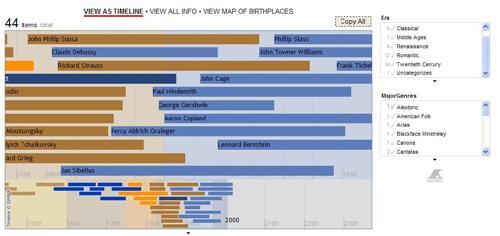
By click/dragging the two horizontal bars of the timeline you can move forward and backward through history to see where your selected composer fits into music history. Clicking on a composer opens a small popup that tells you a brief amount of information about the composer including dates of birth, death, and the locations of the same. It also includes a very brief biography of the composer and other information as necessary.
On the right side of the Timeline window are selection boxes. If you wish to limit the composers displayed on the Timeline to a specific era or to composers who wrote in a specific genre of music you can activate or deactivate the items using these boxes.
Using the Music Composer Database: Full Information View
For a more complete view of a composer's life and additional references (books, audio files, and web links) click on the Wiew All Information link at the top of the Exhibit window. This will switch the Exhibit to a view of vertical tiles, each one with the complete information available about that specific composer. Again you can limit the composers displayed using the selector boxes in the right column, or you can also sort the list by last name, era, birthdate, or other criteria using the selector links at the top of the tile view window.
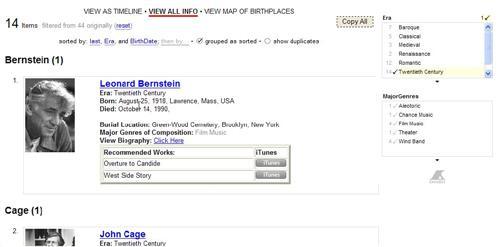
Using the Music Composer Database: Map View
The last view possible with this music composer database is the Map View. Using geographical data and the Google Maps API you can visually see the geographical relationships between as many or as few composers as you wish. Zoom in or out of the map as much as you wish or overlay current satellite images and road labels.
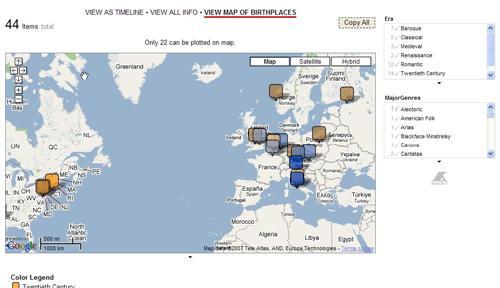
This music composer database is a work in progress. More composers are being added regularly, and improvements to the interface are ongoing. See below for a list of references used to create this database as well as a changelog detailing work done to the database and the Exhibit itself.
Current Composers Listed In This Database:
- Johann Sebastian Bach
- Carl Philipp Emanuel Bach
- Bela Bartok
- Ludwig Van Beethoven
- Leonard Bernstein
- Alexander Borodin
- John Cage
- Giacomo Carissimi
- Frederick Chopin
- Aaron Copland
- Jean-Baptiste de Lully
- Claude Debussy
- Josquin des Prez
- Guillaume Dufay
- John Dunstable
- Daniel Emmett
- George Gershwin
- Phillip Glass
- Percy Aldrich Grainger
- Edvard Grieg
- Joseph Haydn
- Paul Hindemith
- Gustav Holst
- Charles Ives
- Franz Liszt
- Guillaume de Machaut
- Felix Mendelssohn
- Claudio Monteverdi
- Modest Moussorgsky
- Wolfgang Amadeus Mozart
- Giovanni da Palestrina
- Henry Purcell
- Ottorino Respighi
- Robert Schumann
- Jan Sibelius
- John Philip Sousa
- Richard Strauss
- Peter Ilyich Tchaikovsky
- Frank Ticheli
- Antonio Vivaldi
- Karl Maria von Weber
- Richard Wagner
- John Towner Williams
- Ralph Vaughan Williams

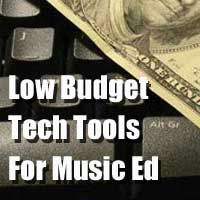


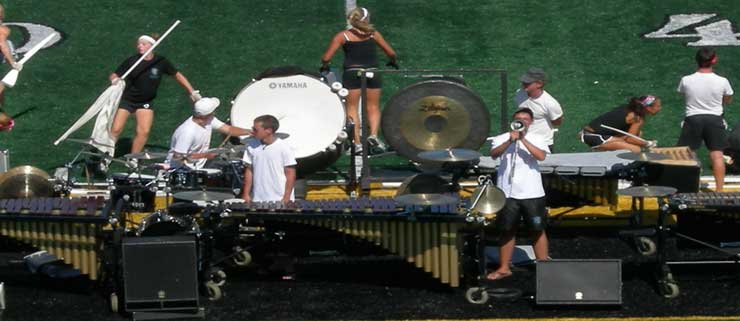


 Scroll down to view the comparison chart of over a dozen different portable digital audio recorders.
Scroll down to view the comparison chart of over a dozen different portable digital audio recorders.

